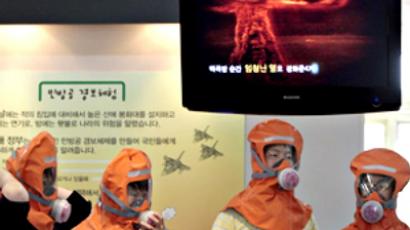Koreans live in peace in Russia amid Pyongyang’s new missile launches
South Korea claims seven short-range missiles were launched from North Korea's east coast on Saturday. But as they slip closer towards a serious standoff, Koreans living in Russia say harmony is easily within reach.
North Korea calls the launches "military training" and has warned ships of possible hazards if they sail inside an area in the Sea of Japan between the 24th June and 9th of July.
The missiles that were fired have a range of about 500 kilometers and were targeted towards the Sea of Japan.
It is the second time North Korea has launched a series of missiles this week, ignoring a UN imposed ban on all ballistic missile-related activities.
As Pyongyang continues to threaten its neighbours, ethnic Koreans continue to live in peace in a Russian village on the border with North Korea.
Peace Street, Friendship Street just around the corner, and nearby Street of Solidarity – these are street names not uncommon in a Russian village, but in a settlement where most people are ethnic Koreans, they gain special significance.
Especially when the border with North Korea is just 400 kilometers away.
Koreans started migrating to Russia long before their peninsula was divided into North Korea and South Korea, so many of them don't identify themselves either with Seoul or Pyongyang.
In fact, the little village of Mikhailovka could be a model for a unified Korean state, where people are more concerned about preserving what they have in common, rather than finding divisions.
Locals are well-aware of the political ping pong between North Korea and South Korea, but still can’t understand why rockets had to be brought into the game.
“It's so strange that one nation would be divided into two such different countries that would dislike each other so much. In our village, we never divide ourselves into those from the North or the South. We are all Koreans,” local resident Artyom Kim says.
Around 60,000 Koreans live in Russia's Far East, making it the third-largest ethnic group after Russians and Ukrainians. Their number would have been much higher if, in the late 1930s, Joseph Stalin hadn't deported thousands of them to Central Asia.
The Kan family was one of the first to come back.
“We may look like Koreans but we are Russians by soul. That's why we have never thought about moving to Korea. But we, of course, want the North and South to live in peace and as one nation,” Aleksandr Kan says.
Ironically, before moving back to the Primorsky region, many lived in Kazakhstan, close to the site where Soviet scientists tested nuclear weapons. Having another such facility close by is a painful reminder of the past.
However, some are hoping politicians will also be able to answer their prayers. A local museum still keeps pictures from September 2000, when the North Korean and South Korean leaders signed their first reconciliation accords.
“North Korean tests are not helping the goal of unification, but we hope that Russia, China and other countries won't let things get worse,” says Khariton Tyo, from the North-East Peace Foundation.













